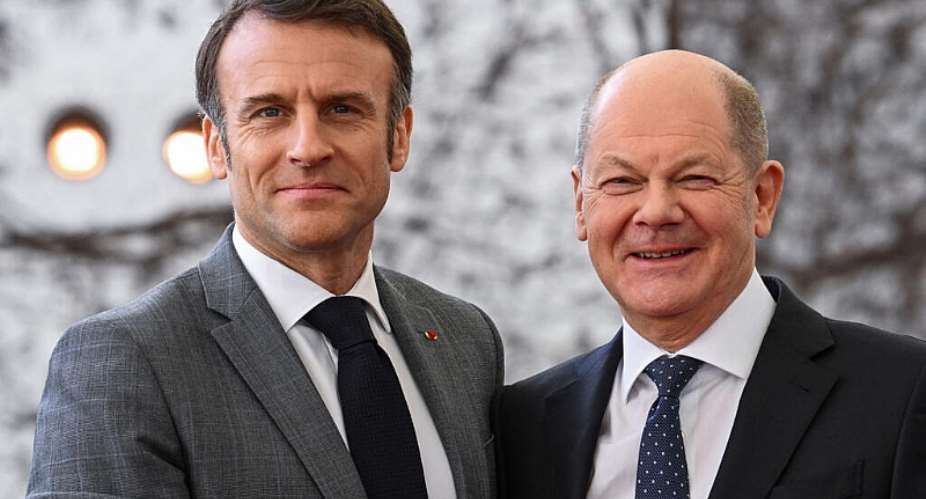French President Emmanuel Macron lands in Germany on Sunday for a three-day state visit as the European Union's two biggest powers try to show unity ahead of next month's EU parliamentary elections.
While Macron is a frequent visitor to Berlin, the trip will be the first state visit in 24 years following a trip by Jacques Chirac in 2000.
The visit will be watched as a checkup on the health of the German-French relationship that drives EU policymaking, at a time of major challenges for Europe: from the war in Ukraine to the possible election of Donald Trump as US president in November.
Accompanied by his wife Brigitte, Macron's trip will begin Sunday afternoon with a day of talks with his German counterpart Frank-Walter Steinmeier, whose role is largely ceremonial compared to that of the powerful French presidency.
On Monday he will travel to Dresden in the former East Germany to deliver a speech on Europe at a European festival.
Tuesday sees Macron in the western German city of Munster and later in Meseberg outside Berlin for talks with German Chancellor Olaf Scholz and a Franco-German joint cabinet meeting.
Differences over defence
The historically strong Franco-German relationship has been strained of late.
Macron and Scholz have very different leadership styles and have publicly clashed on the issues of defence and nuclear energy since Scholz took power in late 2021.
Berlin was taken aback by Macron's refusal to rule out sending troops to Ukraine and German officials are reportedly uneasy at times about his often-theatrical style of foreign policy.
France, which has nuclear weapons, has pushed for a more self-reliant Europe on defence matters and is disappointed by Germany's decision to buy mostly American gear for its European Sky Shield Initiative air defence umbrella.
Germany says there is no credible alternative and that Europe does not have time to wait for a homegrown defence industry to be prepared for threats such as Russian hostility.
Facing the far right
Despite their differences, France and Germany have reached compromises on various fronts of late, from fiscal reform to changes to power market subsidies, allowing the EU to strike deals, and show a more united front.
The two countries will also try to find common ground on the EU agenda for the next five years, in view of the expected strong showing for the far right in the parliamentary elections on June 6-9, making EU decision-making more difficult.
Monday's speech in Dresden, a city where the German far right Alternative for Germany (AfD) has considerable support, will likely see Macron warn of the danger the far right poses to Europe.
Polls show that Macron's coalition is trailing well behind the far right National Rally and may struggle to even reach third place in the EU elections.
Macron is also expected to seek to emphasise the historic importance of the postwar relationship between the two key EU states, as France next month commemorates 80 years since the D-Day landings that marked the beginning of the end of German WWII occupation.
(with newswires)





 ‘I’m sorry’ — Kennedy Agyapong apologises to his followers for supporting Bawumi...
‘I’m sorry’ — Kennedy Agyapong apologises to his followers for supporting Bawumi...
 Don’t let Hopeson Adorye lead you to your grave; he’s cursed — Allotey Jacobs wa...
Don’t let Hopeson Adorye lead you to your grave; he’s cursed — Allotey Jacobs wa...
 No pastor can boldly say he’s richer than me; I’d have imported 5 airplanes, 5 p...
No pastor can boldly say he’s richer than me; I’d have imported 5 airplanes, 5 p...
 ‘Locked up health supplies: Gov’t made a silly mistake for letting health preven...
‘Locked up health supplies: Gov’t made a silly mistake for letting health preven...
 A prophetess, a ‘small boy’ warned Kutu Acheampong of a planned coup on specific...
A prophetess, a ‘small boy’ warned Kutu Acheampong of a planned coup on specific...
![(Rtd)Captain Joel Sowu [left] and Dr. Kwame Nkrumah](https://cdn.modernghana.com/content__/84/56/6172024123202-k5fri7t2h0-captain-joel-sowu-and-kwame-nkrumah.jpg) I must be sick in the head not to acknowledge Kwame Nkrumah as Ghana’s founder, ...
I must be sick in the head not to acknowledge Kwame Nkrumah as Ghana’s founder, ...
 ‘Common Kenkey, Gobɛ will soon be priced in dollars because the economy has been...
‘Common Kenkey, Gobɛ will soon be priced in dollars because the economy has been...
 Failed 1V1D, other wasteful projects will be eliminated if elected — Mahama
Failed 1V1D, other wasteful projects will be eliminated if elected — Mahama
 Indelibly cursed 'baby with sharp teeth' Ablakwa must stop the Akan-hating and b...
Indelibly cursed 'baby with sharp teeth' Ablakwa must stop the Akan-hating and b...
 Asking Ghanaians to make you president again is insulting, disrespectful — Mirac...
Asking Ghanaians to make you president again is insulting, disrespectful — Mirac...
